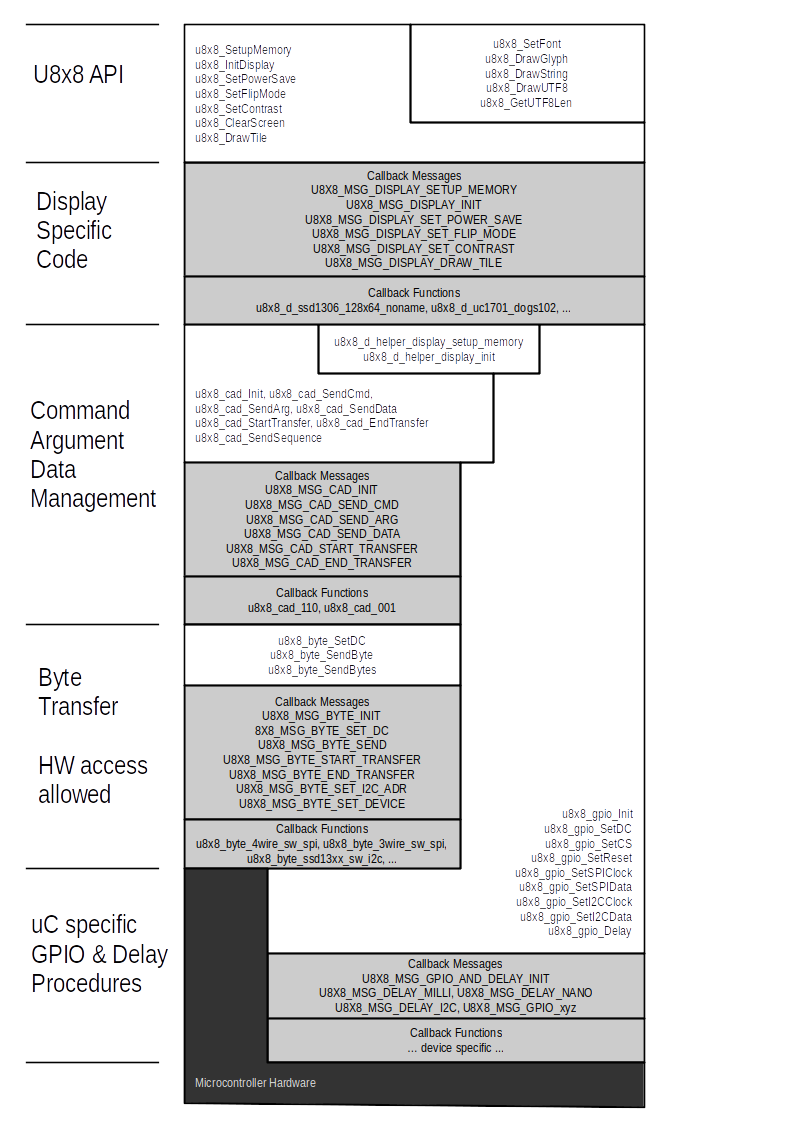First of all, let me note that ESP32 is not officially supported (or at least is not tested)
A couple of questions to try to understand the rationality behind protecting the user from defining the pins themselves.
There is no protection, it is simply impossible for most of the uC to change the SPI/I2C lines. Notable exceptions include the ESP systems. Even more difficult: Arduino SPI and Wire procedures usually do not require pin numbers (and also will not accept/ignore them for most of the Arduino boards).
For I2C (but not for SPI), there is already an u8g2 extension:
U8G2_SSD1305_128X32_NONAME_F_HW_I2C(rotation, [reset [, clock, data]])It is possible to add clock and data lines as optional arguments to the end of constructor. Lets take the Wire lib as an example.
The official page does not at all allow you to use any other pins for I2C: https://www.arduino.cc/en/Reference/WireBegin
However, there is an ESP8266 specific extension which is used by u8g2 in the special case of ESP8266 https://github.com/esp8266/Arduino/blob/master/libraries/Wire/Wire.h#L53
For SPI, no such extension is known to me and also not implemented.
As a conclusion: U8g2 build on top of Wire.h and SPI.h. Both libs do not support pin numbers for any hardware communication. From this perspective, U8g2 just offers the same interface and capabilities like the standard official Arduino API.
These is a extra feature for the ESP8266 board which has to be implemented as an extra feature to u8g2. Or even better, you should approach Arduino people to implement the same extension to the core libraries.
Is it possible to connect displays on both HSPI and VSPI lines?
I assome this is some ESP32 specific thing. So i can not answer this question
I am curious why there are some drivers whose constructors allow for data and clock pin definition and others whose constructors don't. I am using SSD1306.
For SW SPI i just use digitalWrite to communicate with the display. For this I require the pins to which the display is connected. For HW SPI I will use SPI.h which will use fixed pins.
Is this something that needs to be handled by the ESP32 HAL? I haven't had a chance to delve into the U8G2 code, or the ESP32 IDF and/or espressif32 for Arduino.
Again I am the wrong person. I tried to add support for ESP32. At least as of now, there is no official board description for the Arduino IDE. Without that official board support it is difficult for me to add support for ESP32.
Nevertheless, any Pull Requests are highly wellcome.
Oliver







Hello,
U8G2_SSD1306_128X64_NONAME_F_4W_HW_SPI display1(U8G2_R0, /* cs=*/ 5, /* dc=*/ 2, /* reset=*/ 4);Doesn't allow the user to define the MOSI and SCLK pins in the constructor.
It is especially useful on boards with 2 or more SPI modules such as on the ESP32. I probed around with a scope and found out that the constructor selects VSPI as opposed to HSPI module.
A couple of questions to try to understand the rationality behind protecting the user from defining the pins themselves.
Is it possible to connect displays on both HSPI and VSPI lines? I understand that I can use the chip-select (CS) pin to select between displays, however, I am trying to avoid robbing clock cycles and therefore reducing the framerate (not sure how true my claim is...but I just want to try it out).
I am curious why there are some drivers whose constructors allow for data and clock pin definition and others whose constructors don't. I am using SSD1306.
Is this something that needs to be handled by the ESP32 HAL? I haven't had a chance to delve into the U8G2 code, or the ESP32 IDF and/or espressif32 for Arduino.
Thank you!